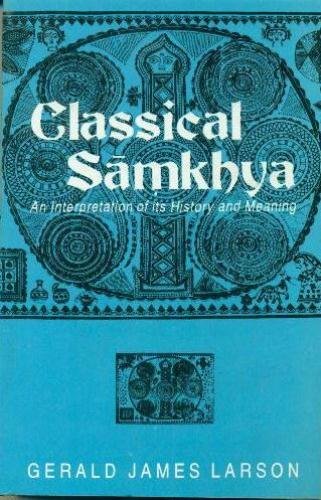Classical Samkhya: An Interpretation of its History and Meaning
Classical Samkhya: An Interpretation of its History and Meaning - Hardcover is backordered and will ship as soon as it is back in stock.
Couldn't load pickup availability
The tradition of Samkhya is one of the oldest and most influential in the intellectual history of India. The fundamental notions of Samkhya namely prakrti, purusa, buddhi, ahamkara, manas and the three gunas provided the conceptual framework in which much of Indian philosophizing occurred, and the classical formulations of Yoga and Vedanta together with many traditions of Buddhist philosophy and meditation developed vis-a-vis the intellectual perspective of the Samkhya. Similarly on a general cultural level the influence of Samkhya was profound and important over many centuries in such areas as law, medicine, ancient science and mathematics, logic, mythology, cosmology and ritual. This study traces the history of the Samkhya not only in the Indian intellectual tradition, but also in the traditions of historical criticism. The book also offers a new interpretation of the philosophical significance of the Samkhya, with special reference to the classical interpretation of the interaction of prakrti and purusa.
For the second editionthe author has also included a Chart of the Twenty-five Basic Principles of the Samkhya, a Glossary of Samkhya Terminology, an additional Appendix which surveys recent scholarly work in the area of Samkhya together with a discussion of Samkhya in the Purana-s and a revised Bibliography.
Review(s)
The term "Classical Samkhya" refers to the Samkhya doctrine as expounded in the Samkhyakarika of Isvarakrsna, together with the commentaries thereon. Author's own interpretation of the karika is given in a separate chapter. The original text of Samkhyakarika in Roman script together with a nice translation is given as an appendix. Glossary of technical terms, a chronological chart, bibliography and index make the work a highly useful one both to the Western and Eastern students of philosophy and research scholars for further studies. - B. Kutumba Rao, Triveni, July-September, 1984
Gerald Larson has here attempted to reconstruct and reinterpret the history and meaning of classical Samkhya. The special contribution of the book consists in showing Samkhya as system of religious thought which seeks to understand the world and man's place in the world from the perspective of the fact of consciousness. The author rightly argues that the dualism between consciousness and the world is fundamental. A useful inclusion in this edition of the book is the glossary of Samkhya terminology. The work is a useful addition to the growing literature on Indian thought in general and on the systems other than Vedanta in particular. - The Weekly-Madras, october 28, 1979
About the Author(s)
Gerald James Larson is Rabindranath Tagore Professor Emeritus, Indiana University, Bloomington, USA, and Professor Emeritus, Religious Studies, University of California, Santa Barbara.
-
Edition
-
Language
-
Publisher




